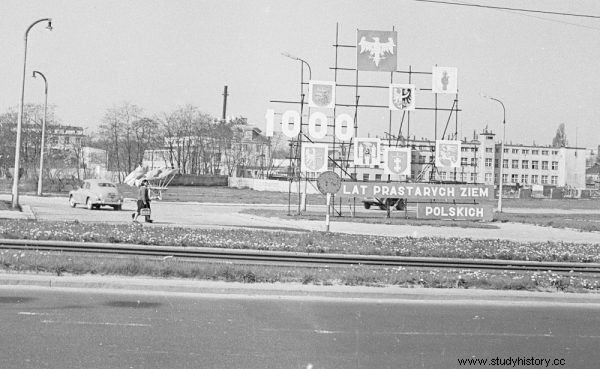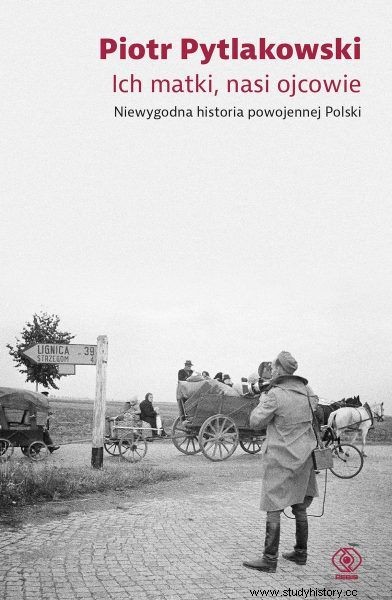The triumphal march of the Red Army through the territories granted to Poland in 1945 left a trail marked by brutality, rape and human harm. Propaganda articles in newspapers only fueled hatred of the former inhabitants of these lands. In the end, the eternal enemy was defeated - ruthlessly and bloodily.
It is 1945, just before or after the end of the war. Poland is moving west. It is losing its eastern borders, and gaining Wrocław, Warmia and Mazury, Szczecin, Opole, Western Pomerania, part of Greater Poland and Silesia, and the Lubuskie region. It includes areas where the locals still live - German, Silesian, Masurian and Kashubian people. Treated like conquered enemies or aliens at best.
Victims or perpetrators?
The Polish element invaded their lands and swallowed everything. Polish carbon paper speaks of historical justice. They caused the war, the victims were ours. This is objective truth, but incomplete.
The wars were not caused by German children, those several years old. They were its victims, just like their Polish peers. They did not understand - how to understand it? - that in the evening they fell asleep in their homeland, and in the morning they woke up in a foreign country. People speaking in unknown languages appeared around. People their mothers were afraid of (…).
When at the beginning of 1945 Soviet soldiers entered Warmia and Masuria, Western Pomerania, Upper and Lower Silesia, the Opole region or Zielona Góra, in reports and reports to the command and party authorities there was no question of liberation or liberation. Things were called by name. More cities were conquered if the Germans resisted, or captured if the defenders surrendered without a fight.

Propaganda decorations in pl. Grunwaldzki in Warsaw.
Zielona Góra was taken on February 14, 1945, almost without firing a shot. Thanks to this, the city was not destroyed. Hard fights were fought for Wrocław, after all it was Festung Breslau. Opole was fought in a similar way. The Germans prepared food supplies for a year. They evacuated civilians. They built several rings of fortifications around the city, through which the Russians were to break through, suffering heavy losses, but they used clever maneuvers and the defense quickly broke down. The city gave up.
Blind Justice
The Third Reich was conquered, not the indigenous Piast lands, as later propaganda claimed. The ancient enemy was defeated. Homes were raided and German perpetrators were searched for, but they were not there. Women with children and the elderly were found in their homes. The men were kidnapped by the war.
Revenge can be sweet. After nearly six years of occupation and the river of blood that flowed over Europe, it was hard to expect the victors to show generosity. They had no mercy, neither will they experience it from us. This is cruel justice. There is no room for nuances here - a German is a German. It doesn't matter that it is an old man, a pregnant woman, a child.
When set in motion, the machine of retaliation grinds evenly and mercilessly. Back then, in 1945, every house, every stone, every grave cried out of terrible harm. The perpetrator of atrocities towards Poles had to be tracked down and destroyed. The slogan "Kill the beast!" Appeared in the newspapers of that time. The enemy was killed in Berlin and other German cities, but he was also searched for in the territories that fell to Poland.

The text is an excerpt from the book by Piotr Pytlakowski, “Their mothers, our fathers. The Inconvenient History of Post-War Poland ”. It tells about the fate of German families in the Commonwealth at the end of World War II, which has just been released by the Rebis publishing house.
The hatred was fueled, although it was not even necessary, because the bleeding and still fresh wounds hurt so much that retaliation was then a general desire. The newspapers only wrote about the Germans with a lowercase letter, each "German" being a synonym of all evil. Everyone, including German women and German children (…).
The Last Judgment
The Polish Western Union was established in 1934. During the war, PZZ activists were hunted down and punished by death by the Nazi authorities. From 1945, the reactivated PZZ dealt with, inter alia, disclosure and verification of Volksdeutsche. In its heyday, it had around 100,000 members.
The press wrote in the spirit of the PZZ proclamation, but also in line with the line of the Polish Workers' Party set by Stalin:“The Germans must be eliminated from the life of Silesia, and all their attempts to sabotage, sabotage or finally provoke will be immediately suppressed. The issue of the liquidation of Nazi influences, which must permeate the entire life of Silesia, is particularly important in two areas:the policy of provisions and housing ".
In this form, calls were made to limit food rations from the German population and to take away their flats, so needed by Poles, who were settled in Upper and Lower Silesia and in the Opole region. The language of propaganda did not distinguish bad Germans from good, Nazis from ordinary people. Everyone was to blame and everyone was to be punished.

Leaflet on the plans for the development of the Recovered Territories.
In an article reprinted from the Soviet press, the author, signed Gorbatov-Kurgan, threateningly proclaimed:“Well, everyone will get what he deserves:the bloody specter of war, Hitler, his satellites Himmler and Goebbels will soon be waiting for their strings. But the fair court of nations will also be answered by those who were the mainstay and support of the criminal regime:ordinary, civil, "peaceful" Germans, parasites. Slave and human blood merchants. The court goes. Russian tanks are already near Berlin "(...).
Artur Depta, the manager of buildings in Sosnowiec during the occupation, was tried in Katowice. He was accused of removing the teacher Barbara Z. and her mother from the apartment. The newspaper reported:“At the trial, he pleaded not guilty, giving evasive responses. (...) After the speech of the prosecutor and the defense, the court pronounced the sentence of Depta to death and deprivation of rights. "
There wasn't a day when new death sentences were not reported. Headlines from newspapers:"Odniemować Polish lands", "The traitor of the nation condemned to death", "There is no place for Germans", "Flats for Poles, not Germans", "We say no to foreigners", "Polish schools for Polish children" (...). Hurt by the horrors of war, they needed an outlet for their pain and unnoticed they turned into harmers. These were, in general, our fathers. And on the other side of the mother of enemies. And their children.
Source:
The above text is an excerpt from the book by Piotr Pytlakowski Their mothers, our fathers. The Inconvenient History of Post-War Poland. which has just been released by the Rebis publishing house.
